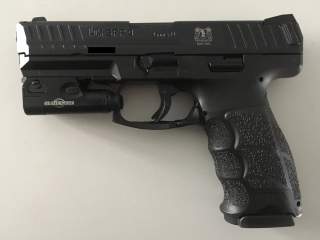Meet Heckler & Koch's VP9 Handgun: The Gun the Army Should Have Purchased?
The VP9 is sleek and modern looking, in part due to a complete lack of a hammer at the rear of the gun.
One big question: why was the VP9 never seriously considered as part of the U.S. Army’s Modular Handgun System (MHS) competition?
One of the most interesting semi-automatic handguns on the American firearms market is made in Germany. Designed and is manufactured in Oberndorf, Germany, the Heckler & Koch VP9 pistol is touted as one of the most durable, reliable handguns in the world. Born in aftermath of World War II, gunmaker Heckler & Koch has risen to become a major force in the international arms market.
(This first appeared last year.)
The story of Heckler & Koch (HK) began in immediate the aftermath of World War II, when Oberndorf, Germany fell under the control of French occupation forces. French troops confiscated the local Mauser factory’s tooling, which had produced 70,000 rifles a month at the height of the war, and put it on a train headed to France. Before the train was set to depart three Mauser engineers—Edmund Heckler, Theodor Koch and Alex Seidel—stole back some of the tooling and hid it until 1955, when then–West Germany’s ban on arms manufacture ended. HK has since built a wide variety of arms, including the widely distributed G3 assault rifle, the MP-5 series of submachine guns, and the current standard assault rifle of the German Army, the G36. The U.S. Army’s newest sniper rifle, the M110A1, is a variant of the Heckler and Koch G28E sniper rifle.
Recommended: Uzi: The Israeli Machine Gun That Conquered the World
Recommended: The M4: The Gun U.S. Army Loves to Go to War With
Recommended: Why Glock Dominates the Handgun Market (And Better than Sig Sauer and Beretta)
Heckler & Koch’s work with polymers in weapon design goes back decades, ironic for a company founded by veterans of a company that produced essentially the same Mauser rifle for just as long. The Heckler and Koch VP70, or Volkspistole (“People’s Pistol”) year 1970, was the world’s first polymer pistol, entering production a full decade earlier than the Glock 17. Although a commercial failure, its resemblance to a modernized Walther PPK gave it a memorable James Bond–type cachet.
Heckler & Koch’s latest pistol, the VP9, follows in the footsteps of the VP70 and other polymer pistols. Introduced in 2014, the VP9 uses a polymer frame that houses the magazine and fire control group. The machined metal slide includes a cold hammer forged barrel. Cold hammer forging creates the barrel at temperatures much lower than traditional red hot forging with fifty tons of pressure per hammer, creating a stronger, longer-lasting barrel. Heckler & Koch claims that individual VP9s fired more than 90,000 rounds each during internal testing, which is probably enough to last even extreme users a lifetime.
The VP9 is a striker-fired pistol, meaning it uses a striker mechanism instead of a traditional firing pin mechanism to strike the cartridge primer and send the bullet flying. In a striker-fired pistol, a spring-loaded firing pin is partially cocked by the movement of the slide, with the rest of the cocking taking place when the trigger is pulled.
The advantages of a striker-fired pistol are considerable. For one, accidentally dropping the gun with a loaded round won’t cause it to fire since there is no trigger movement to fully cock it. This eliminates a traditional source of negligent discharges. Striker fired guns also don’t have the long trigger pull of other so-called double action pistols, in which a single trigger pull both cocks the pistol and discharges the gun. Unlike many striker guns which have progressively heavier, long trigger pulls, the VP9’s trigger pull is described as short and light, resembling the short pull of a single action pistol, with a short reset.
The VP9 is sleek and modern looking, in part due to a complete lack of a hammer at the rear of the gun. The handgun has modular ergonomics—that is, the backstrap and grip panels can be replaced to create a pistol that feels more comfortable in a smaller or larger hand, with a thicker or thinner grip. The pistol comes with three backstrap panels and six grip panels, allowing for twenty-seven different ergonomic configurations.
Like most conventional, modern 9mm pistols, the VP9 magazine stores ammunition in two side-by-side “double stack” rows. One minor downside is that the VP9 magazine can store only fifteen rounds of ammunition, while competitors in the same class, the Glock 19 and Sig Sauer P320 can store seventeen rounds.
One big question: why was the VP9 never seriously considered as part of the U.S. Army’s Modular Handgun System (MHS) competition? The VP9 met most, if not all, of the MHS program requirements. The MHS competition, which Sig Sauer won in January 2017, specified a modular ergonomic system. Indeed Glock, which had no such system was considered a viable contender far longer than the VP9 was. The VP9 even had a shorter, compact version, the VP9SK to satisfy the compact pistol requirement. We may never know whether the VP9 was pushed hard enough by HK or snubbed by the Army.
The Heckler & Koch VP9 handgun hasn’t picked up many military orders—it is mostly found in police service in the United States and Europe. Still, it’s a fresh design with a world-beating trigger and will likely remain on the market for decades to come.
Kyle Mizokami is a defense and national-security writer based in San Francisco who has appeared in the Diplomat, Foreign Policy, War is Boring and the Daily Beast. In 2009 he cofounded the defense and security blog Japan Security Watch. You can follow him on Twitter: @KyleMizokami.
Image: Creative Commons.


